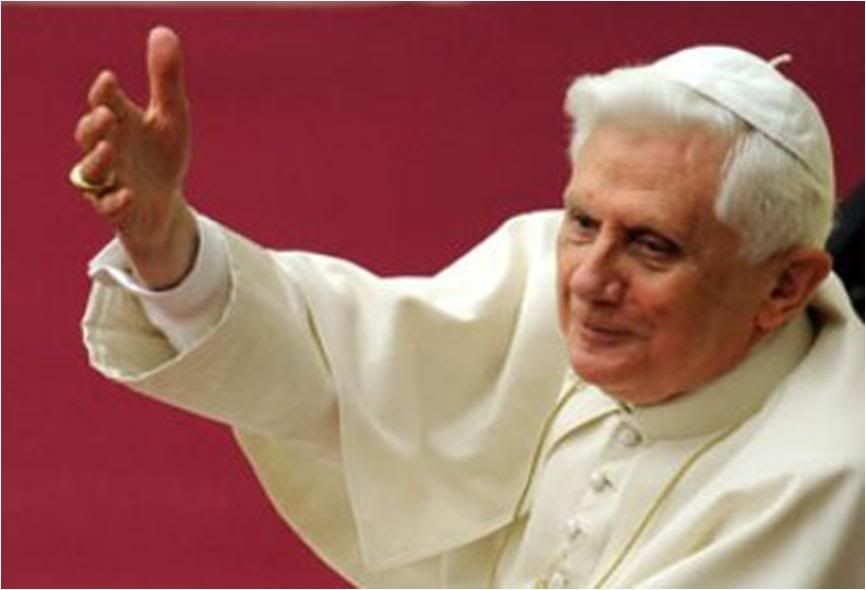
 Media have a problem dealing with any discourse that has multiple points of significance, as do most of Benedict XVI's texts, including his annual address to the Roman Curia. The Italian news agencies deal with it by writing a separate news item about each of the points made, but it is difficult to imagine any newspaper using these items. They would much rather use a single 'wrap-up' account.
Media have a problem dealing with any discourse that has multiple points of significance, as do most of Benedict XVI's texts, including his annual address to the Roman Curia. The Italian news agencies deal with it by writing a separate news item about each of the points made, but it is difficult to imagine any newspaper using these items. They would much rather use a single 'wrap-up' account.
The problem is there hardly ever is a satisfactory wrap-up account - and anyone interested in what the Pope says would do much better to read him dreictly, anyway.
All other news outlets, including the international news agencies, choose a single focus, and if there is space, they will also mention the other points in passing.
So it is with the Italian media today - the Anglophone media, outside of the Holocaust angle, have yet to seee a full translation, it seems.
I chose to translate this because it was written by a priest, even if it focuses on just one of the points dealt with by Pope Benedict yesterday.
Benedict XVI reminds bishops again
that they are not politicians
by Fr. Massimo Camisasca
Superior-General, Missionaries of San Carlo Borromeo
Translated from

December 22, 2009
The San Carlo missionaries are the priestly fraternity of the Comunione e Liberazione movement.

In certain ways, the Pontificate of Benedict XVI more and more resembles that of some Popes in the late Roman era like Leo the Great and Gregory the Great.
Papa Ratzinger is among other things a great liturgist. Liturgy has been a special interst of his as a theologian. It has also become a field of action for his Petrine ministry.
He wishes to rescue the celebration of the Sacraments, and the priesthood who administer them, from any reductionism - either from those who would make the liturgy a 'magical', a-historical rite, detached from its concrete Judaeo-Christian context, or those who have flattened the rite to its political dimension, in a partisan and ideological way.
A priest cannot be partisan because he represents God's universal plan for human salvation.
This issue is always relevant. Recently, a bishop asked the Holy See for permission to join the House of Lords of the British Parliament. The Pope declined.
In recent decades, we have seen priests involved at the summit of government in Haiti and the Democratic Republic of the Congo, and most serious of all, the bishop who was elected President of Paraguay [whose requrest to be reduced to lay state was granted by the Pope after his election].
In the 1960s and 1970s, Italy had its share of dissenting priests who were openly militant on the extreme left.
[There still are quite a few at present, who get great play in the media, especially on TV.]
An exception was the late Don Gianni Baget Bozzo, who never left the Church
[even if he was suspended from executing his priestly ministry by John Paul II while he was a member of the Ruopean Parliament, and who was moreover a traditionalist who espoused orthodox Catholic teachings.]
How do priests balance it so that they do not become totally uninterested in the social issues of the
polis, nor fall into non-Christian spiritualism, nor become ideological partisans who have no room for the opinion of others and are caught in a closed historicism?
Benedict XVI has sought to give an answer to this, especially in his encyclical
Caritas in veritate, which he cited in his Christmas address to the Roman Curia yesterday.
He made this in refernce to his trip to Africa in early 2009 and the subsequent Special Synodal Assembly for Africa.
"How can we be realistic and practical, without arrogating to ourselves a political competence which is not ours?". the Pope asked. "How do we find the rather narrow path between simple theological theory and immediate political action?"
Caritas in veritate sought to show the way through the social capabilities of the Christian virtues of faith, hope and charity. These virtues are not only for a privileged group of men who can be disinterested in history, but on the contrary, they express a universal and very human dynamism of confidence, creativity, collaboration and solidarity, that can create a new social fabric.
The Pope cited an example to the Curia, in the reconciliation that is necesssary in African and other parts of the world where there are serious conflicts: If we want political and economic structures that favor reconciliation [such as those that developed in western Europe after World War II], we need "interior processes of reconciliation' that make a new coexistence possible.
"Every society needs reconciliations in order that there may be peace. Reconciliations are necessary even for good politics, but they cannot be realized only for that reason".
Indeed, the political but non-partisan aspect of Christianity is becoming more evident in the teaching of Pope Benedict.
[Modificato da TERESA BENEDETTA 18/02/2010 04:01]